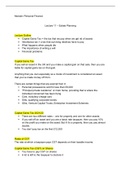Module: Personal Finance
Lecture 11 – Estate Planning
Lecture Outline
Capital Gains Tax = the tax that we pay when we get rid of assets
Inheritance tax = a tax that surviving relatives have to pay
What happens when people die
The importance of writing a will
Financial problems
Capital Gains Tax
If you sell an asset in the UK and you make a capital gain on that sale, then you are
liable for capital gains tax on that gain.
Anything that you own especially as a mode of investment is considered an asset
that you’ve made money off from.
There are certain things that are exempt from it:
Personal possessions sold for less than £6,000
“Principal private residence” or main home, providing that is where the
individual concerned has been living
Cars, including vintage cars
Gilts, qualifying corporate bonds
ISAs, Venture Capital Trusts, Enterprise Investment Schemes
Capital Gains Tax 2021/22
There are two different rates – one for property and one for other assets.
If you sell off an asset and you are a basic rate taxpayer, then you pay 10%
on the profit you make on the asset. But if it’s a property, then you pay almost
double.
You don’t pay tax on the first £12,300
Rates of CGT
The rate at which a taxpayer pays CGT depends on their taxable income.
Capital Gains Tax (CGT) on Shares
You have to pay CGT on shares
A lot is left to the taxpayer to declare it




